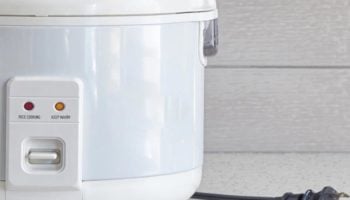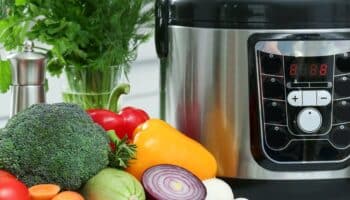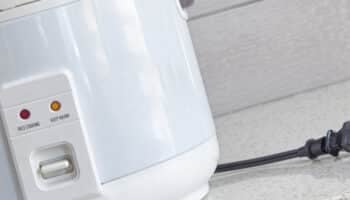Rice cookers have not always been around. Decades ago, people had to boil their own rice in boiling pots, and they got by just fine, so, are these appliances really all that? The answer is, it depends.
If you’re like most people, living a hectic lifestyle between work, family and trying to make some time for social interactions, it can be very difficult and time-consuming to try to prepare your rice in a boiling pot.
This is where rice cookers shine.
On the other hand, if you live a quieter lifestyle and have little to no room to spare in your kitchen, using a boiling pot might not be such a bad idea. Again, it’s all about what you need.
That being said, it’s undeniable that the price tag differs greatly between a rice cooker and a boiling pot, which is why I’ve prepared the list below, including the pros and cons of each option. This way, you can make the most informed decision and choose what works best for you.
All set? Let’s go!
Rice Cooker Pros
#1 Convenience
These appliances are great for saving you time and making your life easier. The selling point for rice cookers is that you can get the perfect rice without doing too much. Just make sure you put in the right ingredients and the appropriate amount of water, and you’re good to go!
Moreover, some of them are already preprogrammed to cook your rice depending on how you like it, which is a lifesaver when you’re not sure how to go about it.
#2 Thermal Sensors
High temperatures are the enemy
Something you’ll be hard-pressed to find in a boiling pot are thermal sensors. These nifty little components do exactly what you’d expect them to. They sense the temperature of your food and determine when it’s time to shut off.
This means that, when using your rice cooker, you won’t have to be in the kitchen while your rice cooks, as your appliance will know when the time is right to avoid burning or overcooking it.
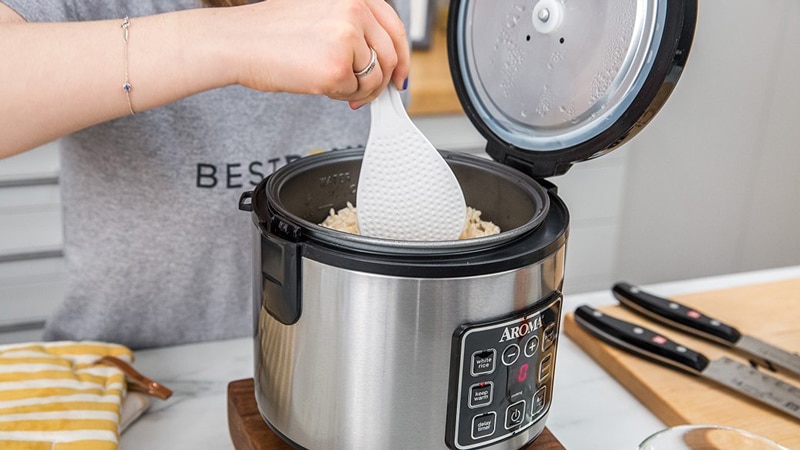
#3 Moisture Detection
Can your pot detect moisture?
You can’t cook rice without water, which means that having a built-in sensor in your rice cooker that detects when the moisture is running low is essential to preventing dry rice and other unpleasant culinary outcomes.
As the water in your rice boils down, it will trigger a programmed response in your appliance that will gradually reduce the cooking temperature.
This, along with the thermal sensors mentioned above, works wonders for people who don’t have the time to babysit their rice as it cooks.
#4 Automatic Shutoff
Have you ever come home to burned rice and a smokey kitchen? If you’ve ever owned a rice cooker, the answer is most likely, “no”.
And the reason behind it is a simple safety mechanism.
Most rice cookers have an automatic shutoff built into them that kicks in when they detect that there’s no more moisture in the rice inside them and the temperature is peaking.
While this function varies from model to model, in most cases, this feature will activate after the rice has been in warm mode for a couple of hours. This not only prevents house fires and burned rice, but also sky-high electricity bills.
#5 Warm Mode
Keep your rice meal ready at all times
Just when you thought there was nothing else a rice cooker could possibly do to make your life easier, along comes the warm mode.
This convenient feature keeps your rice warm and soft for hours. When the appliance detects that the cooking process is done, it switches into this mode and can stay on it for about four hours before automatically shutting off to prevent burning.
If you’re constantly running and busy, this is definitely a valuable advantage over a boiling pot.
Rice Cooker Cons
#1 Expensive
Is the price worth the benefits?
Yes, rice cookers are wonderful kitchen helpers and great problem-solvers, but unfortunately, that does not always come cheap.
While you can find decent alternatives starting at $60 at online marketplaces, chances are that they won’t have most of the features mentioned above, which are the selling point for most potential buyers. For those, you’ll have to spend at least $100.
When you compare that price tag with a boiling pot that you can get for as little as $25, some things certainly start to come into perspective.
That being said, the pot you can buy for that price will not blow your mind or be built with the best materials. It’s a trade-off.
#2 Single purpose
This is probably the strongest argument against these wonderful appliances. As their name suggests, rice cookers are designed to cook nothing more than rice, which, when put into perspective, makes the price tag a little more intimidating.
If you use rice in most of your meals and just can’t live without it, this purchase is definitely justified and could even be considered a necessity, but otherwise, a boiling pot will offer you much more versatility at a significantly lower price.
#3 They take up space
Always consider your kitchen distribution
If your kitchen looks like one of those Home & Decor magazines, this won’t be an issue, but if you’re like most of us, your cabinets are probably already full of other kitchen appliances, pots, and pans.
I normally store my pots inside one another like culinary “matryoshkas”, which is something you cannot do when you own a rice cooker.
Sure, you can leave it on the countertop forever, but if you ever want your kitchen to look as uncluttered as possible, this could put you in an inconvenient situation.
How Much Does a Good Rice Cooker Go For?
As I said before, you can find many options out there, but a good starting point is probably $80-$120, as this is the range where rice cookers start including more programming functions and attractive features for cooking.
That being said, if you’re not looking for something too fancy, $60 can get you a decent, basic appliance that will serve its purpose perfectly.
Boiling Pot Pros:
#1 They Are Cheap
Cheap, versatile, and durable, what’s not to love?
Pots come in all shapes and sizes, and the materials used to build them vary depending on their price. That being said, most household boiling pots are not very expensive, with starting prices as low as $25.
When compared to the cheapest rice cooker sold online, which goes for about $45, this sounds like a cheap and versatile alternative. Boiling your rice in boiling pots definitely wins in this area.
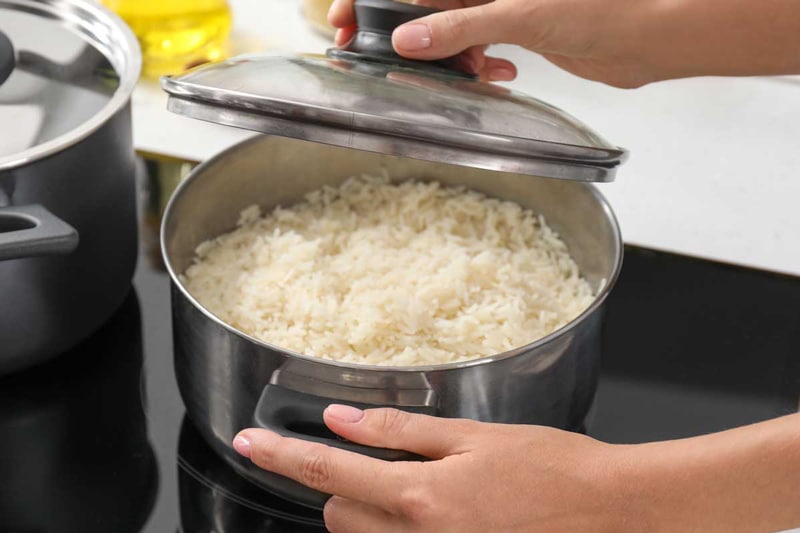
#2 Versatility
A boiling pot is universal. Whether you’re trying to soften some potatoes or cook an entire stew, this kitchen appliance has got your back!
The fact that most boiling pots are not very expensive and can be used for several purposes makes a very strong case against buying a rice cooker, especially when you’re not a rice lover.
A pot will probably last as long, or even more, than a rice cooker, and do anything the latter can. That is, if you’re willing to constantly supervise your rice and throw away one or two batches that turn out dry or burn altogether.
#3 Easy Maintenance
Cleaning and washing, that’s all a pot needs
Unlike rice cookers, boiling pots do not have any electronic components that might break or blow up. This makes a compelling argument for boiling your own rice, as maintaining the electronic appliance can be costly and time-consuming.
Boiling pots are very simple, and all they require to be maintained in tip-top condition is proper washing and rinsing, and maybe additional cleaning if something in them has gone bad.
Moreover, if your boiling pot breaks, you can drive to any store and replace it instantly, whereas rice cookers will require you to call a technician or look for replacement parts, as well as through the entire repair process.
Granted, you can also buy a new rice cooker anywhere, but as I’ve said before, they’re crazy expensive!
Boiling Pot Cons:
#1 Time-Consuming
This is where rice cookers take the cake. These electronic appliances require very little from you to prepare delicious, soft rice, whereas boiling pots will demand all your attention, lest you have a smokey kitchen and a ruined dinner.
Boiling your own rice in a boiling pot is very time-consuming, as it can burn in the blink of an eye, and there’s no guarantee that it will turn out the way you want it to.
If you don’t feel like spending money on a rice cooker, that is perfectly fine, just bear in mind that you’ll be unavailable to tackle other chores around the house while your rice cooks.
#2 They Take up Space
There’s really no way around this, although boiling pots take up significantly less space in your kitchen cabinets than rice cookers, you will still need to find a place to store them.
This is especially a problem when you’re using a very large pot, as letting it dry on your dish rack and finding a convenient place for it can be challenging.
How Much Does a Good Pot Go For?
With boiling pots, you’re not really looking for features or programming options, but quality materials. A good starting point would probably be $30-$40. Within that price range, you’ll find a durable pot made from decent food-grade materials.
Conclusion
Rice cookers vs boiling your own rice, is there really a right answer? Not quite.
This is one of those things in life that are subjective. There are certainly factors for and against choosing one over the other, but they will all vary in importance depending on your particular lifestyle and eating habits.
At the end of the day, it all boils down to how much time you’re willing to spend in the kitchen, and the price you’re willing to pay for certain commodities.
If you love rice and have some spare money to spend, a rice cooker is the way to go, as it will make your life much easier. On the other hand, if you don’t mind watching over your boiling pot and want to save some money, that’s also totally fine.
To each their own.
Thank you very much for reading!
— Craig.
Frequently Asked Questions
Can I Cook Stews in a Rice Cooker?
It depends on the make and model of your appliance.
Some units can be used to cook stews, as they have a “soup” or “oatmeal” mode; however, it’s important that you check your User Manual to see whether your particular cooker is capable of this.
Do All Rice Cookers Have Automatic Shut-Off?
Some cheap models might not, but even in that case, you’re not out of luck.
If your rice cooker has no “warm mode”, or it’s simply not working, and you don’t want to replace it, you can always buy an automatic outlet timer from an online marketplace.
These work by cutting off the electricity supply to your rice cooker from the outlet, prompting it to turn off.
Are Rice Cookers Safe to Sterilize Baby Bottles?
Some are.
Just as it happens with stews, there are some rice cookers capable of sterilizing baby bottles without burning them. To check whether yours can do this, read your User Manual or go to Google and search for it on your manufacturer’s website.
All you have to do is search for “Is <Your Rice Cooker’s Make & Model Go Here> Safe for sterilizing baby bottles”? You should find all the answers you’re looking for there.





